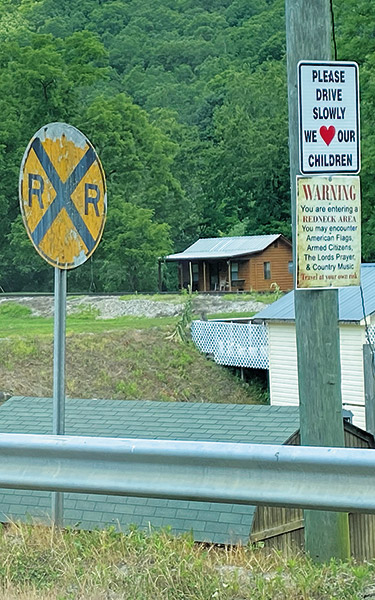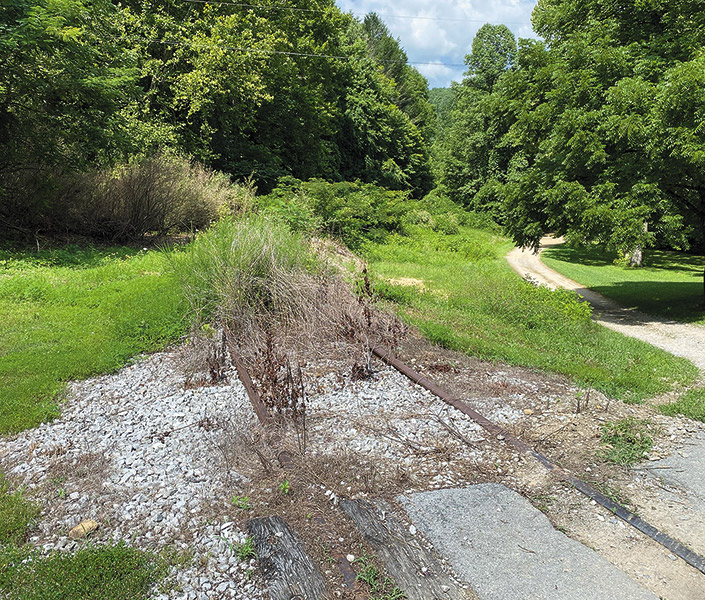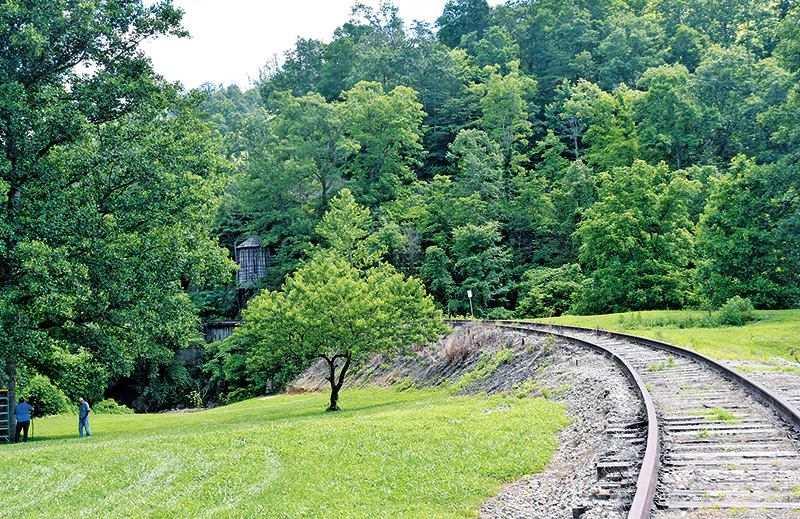Kentucky railroad company says local rail authority has ‘no standing’ in rail dispute
The Kentucky-based R.J. Corman Railroad Co. says in its latest filing with the federal government that Anderson County Mayor Terry Frank and the North East Tennessee Rail Authority that she chairs have “no standing” to challenge the feds’ June 26 ruling that would allow for immediate abandonment of an historic rail line in Scott, Campbell and Anderson counties.
Also, in its July 9 reply to Mrs. Frank’s appeal of the STB order, R.J. Corman repeatedly refers to her as “Mr. Terry Frank” and “Mr. Frank,” and asks the federal railroad regulatory agency to deny the appeal.
R.J. Corman has been dealing with Mayor Frank in her efforts to save the historic former Tennessee Railroad line from Oneida to Devonia in remote Anderson County for nearly two years.
The railroad company’s lawyer who has written and signed the R.J. Corman filings with the STB over the past several months, Catherine S. Wright, responded to an email from The Courier News last Friday indicating that she did not know that Frank was a woman.
Earlier on Friday, The Courier News had emailed a photo of Frank to Wright, and informed Wright that Frank is not a “he.”
“Thank you. Another person kindly pointed out my error yesterday,” Wright said in her response to the newspaper.
As of press time Tuesday, the STB had not made any new rulings in the case, which was originally filed by R.J. Corman in early March requesting an exemption under federal railroad law to allow it to permanently abandon and pull up the rail line. The railroad line dates to 1889, but has not seen any trains run since 2013, when a deep coal mine near Devonia stopped production.
In its reply to Frank’s appeal on behalf of the North East Tennessee Rail Authority, Corman said, “The [rail authority] does not own the Oneida Line, nor did it submit an offer of financial assistance in this matter. It cannot now appeal the Director’s Decision in its own right.”
But officials involved in the effort to save the rail line for a proposed tourist train operation and future freight service say Corman’s statement isn’t true, and that the rail authority legally owns a 21 percent interest in the line. The rail authority has provided as much as $2.1 million in state financial aid to keep the rail line open, they say.
The North East Tennessee Rail Authority, created by the Tennessee legislature to manage and preserve regional railroad assets, covers Scott, Campbell and Anderson counties. The mayors of all three counties are members of the authority’s board of directors.
Frank’s appeal was in addition to an appeal filed June 29 by the apparently unsuccessful bidder for the rail line through the STB’s “Offer of Financial Assistance” process, the Arkansas-Oklahoma Railroad Co., which wants to buy, rehabilitate and reopen the 42-mile line.
Both appeals were filed with the STB, which in its June 26 order denied the petition from Arkansas-Oklahoma Railroad Co. to purchase the line from the R.J. Corman for $424,000.
In the appeal filed Monday (July 6) by the local railroad authority, and signed by Frank, at least three prospective customers were mentioned as potential shippers or users of the line, with the prospects of moving more than 1,000 rail cars a year on the line.
“[The railroad authority] asserts that the [STB] Director’s decision [to deny sale of the line] is based on a ‘clear error of judgment’ based on the new evidence of shipper need for rail service set forth herein,’” the mayor’s appeal began.
The appeal noted that at least two logging operations and an Arizona-based railroad car storage and maintenance service have plans to use the line if it is preserved and reopened.
In a separate filing last week, the Phoenix company, IRAIL Car Services, told the STB that it would be a major user of the line, which has not seen any rail traffic since 2013.
The rail authority’s Monday appeal concluded that “the Board should find that NETRA and AOK have met [the] requirement of a ‘continued need for rail service’ and grant this appeal to prevent manifest injustice or correct a clear error of judgment.”
If the appeals are ultimately denied, the STB’s June 26 ruling would allow Corman to abandon the route and begin pulling up track and other components of the line.
In its decision, the STB said that the proposed buyer (Arkansas-Oklahoma Railroad) had not “sufficiently demonstrated ‘a continued need for rail service’ on the line,” adding that the line had “no active shippers.”
According to the STB, for the proposed buyer to win a bid for a rail line that is about to be abandoned under its rules, “an offeror must demonstrate through evidence that there is a continued need for rail service on the line.”
Statements supporting the bid by the Arkansas-Oklahoma Railroad Co. of Wilburton, Oklahoma, were filed by Anderson, Scott and Campbell county governments, the North East Tennessee Rail Authority, and others, including two proposed shippers on the line – National Coal Co. of Knoxville and Evergreen Packaging Co. of Pioneer. Both said they hoped eventually to ship coal and timber, respectively, on the line at some point.
The STB said that while the purchase offer (Offer of Financial Assistance, or OFA) by Arkansas-Oklahoma Railroad and the statements submitted by the other parties showed that there was “community support for preserving the Line,” but that they provided “no specific detail demonstrating any commercial need for rail service.”
The board also dismissed the use of the line by a planned passenger rail excursion company, saying that provisions allowing a forced sale under an OFA require future use of such a line for freight shipments, and that passenger service does not qualify.
Mayor Frank has been leading efforts to save the scenic stretch of railroad since 2018, when R.J. Corman first indicated it planned to abandon the line.
The STB’s June 26 decision would allow a trail consortium to continue working with R.J. Corman on an agreement to turn the line into a hike-and-bike trail, which would at least preserve the right of way for future use as a rail line, if necessary. But the steel rail and ties would be removed, and any reinstallation of those could be cost-prohibitive, Frank said.
Owned by Norfolk Southern Corp. (formerly The Southern Railway) from 1973 until Knoxville-based National Coal Corp. bought it in 2006 for $2 million, the line was begun in 1889 and extended to its current terminus at a now-abandoned coal preparation plant at Devonia in 1912.
When National Coal was on the verge of bankruptcy in 2010, it sold the line to R.J. Corman for $3 million, and it was used to haul coal out of the Fork Mountain area from a deep mine until that operation shut down in 2013. Since then, the line has not been used, and has fallen into disrepair.
Part of the line from Huntsville in Scott County to Indian Fork in Anderson County did have a short life as a tourist excursion route from 2008 to 2010 when Scotty Phillips, owner of the New River General Store at Devonia, and business partner Jimmy Byrge of Knoxville started the New River Scenic Railway.
They ran the train – consisting of a vintage 1951 Alco RS3 diesel locomotive and two passenger cars – until shortly after R.J. Corman bought the rail line from National Coal and proceeded to terminate the excursion operation’s rights to use the tracks.
The former New River Scenic Railway engine and two rail cars – which Phillips brought here from Arizona -- have sat abandoned on a siding behind the Devonia coal-prep plant along Tennessee Route 116 since 2010, and all three units have been heavily vandalized.
Frank noted earlier that there are still significant coal reserves in the areas of Anderson County that are served by the rail line, controlled by National Coal, a subsidiary of a company owned by West Virginia Gov. Jim Justice.
“Once a rail line is abandoned and the tracks are pulled up, it’s nearly impossible to ever get it back,” Frank said.





